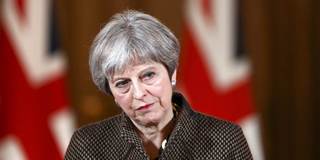With economic conditions returning more or less to normal around the world after a decade of financial crises, nationalist populism is now seen as the biggest threat to global recovery. But is it possible that this consensus has emerged just as the populist wave has crested?
NEW YORK – With economic conditions returning more or less to normal around the world after a decade of financial crises, nationalist populism is now seen as the biggest threat to global recovery. That was certainly true of the finance ministers who gathered in Washington, DC, this month for the IMF’s annual spring meeting. But is it possible that this consensus has emerged just as the populist wave has crested? Rather than populist politics undermining economic recovery, could economic recovery be undermining populist politics?
Looking around the world, populist economic policy appears to be in retreat, even though no clear alternative is visible. In the United States, President Donald Trump seems to be curbing his protectionist instincts, and economic relations with China are stabilizing. In Europe, despite the media focus on the success of xenophobic politicians in Hungary and Poland, the pendulum is swinging away from economic nationalism in the countries that really matter: France, Germany, Spain, and Italy, where the two populist parties that recently achieved electoral breakthroughs are now vying to show their devotion to the euro.
Even in Britain, where economic nationalism won its most spectacular victory over globalization and multiculturalism in the 2016 Brexit vote, the tide may be turning. The British government is gradually realizing that voters do not really want the complete rupture with Europe demanded by hard-core Euroskeptics. Neither of the two alternatives to EU membership presented in the Brexit referendum – an inward-looking, protectionist “Little England,” or a post-imperial “Anglosphere” based on the “special relationship” with America and the Commonwealth – is turning out to be economically feasible or politically attractive to voters. While only 3-4% of voters admit to changing their minds about Brexit, large majorities want to keep most of the benefits of free trade, easy travel, immigrant labor, and strong environmental, consumer, and health regulation.

NEW YORK – With economic conditions returning more or less to normal around the world after a decade of financial crises, nationalist populism is now seen as the biggest threat to global recovery. That was certainly true of the finance ministers who gathered in Washington, DC, this month for the IMF’s annual spring meeting. But is it possible that this consensus has emerged just as the populist wave has crested? Rather than populist politics undermining economic recovery, could economic recovery be undermining populist politics?
Looking around the world, populist economic policy appears to be in retreat, even though no clear alternative is visible. In the United States, President Donald Trump seems to be curbing his protectionist instincts, and economic relations with China are stabilizing. In Europe, despite the media focus on the success of xenophobic politicians in Hungary and Poland, the pendulum is swinging away from economic nationalism in the countries that really matter: France, Germany, Spain, and Italy, where the two populist parties that recently achieved electoral breakthroughs are now vying to show their devotion to the euro.
Even in Britain, where economic nationalism won its most spectacular victory over globalization and multiculturalism in the 2016 Brexit vote, the tide may be turning. The British government is gradually realizing that voters do not really want the complete rupture with Europe demanded by hard-core Euroskeptics. Neither of the two alternatives to EU membership presented in the Brexit referendum – an inward-looking, protectionist “Little England,” or a post-imperial “Anglosphere” based on the “special relationship” with America and the Commonwealth – is turning out to be economically feasible or politically attractive to voters. While only 3-4% of voters admit to changing their minds about Brexit, large majorities want to keep most of the benefits of free trade, easy travel, immigrant labor, and strong environmental, consumer, and health regulation.